|
|
[ top ]
| Barton Blake, ‘James Stephens of Dublin - Novelist’, in Vanity Fair (Dec. 1916) — |
|
| See full-text copy - as attached. |
[ top ]
Padraic Colum, Preface to Mary, Mary (NY: Boni & Liveright [1917]) - being the American [2nd] edition ofThe Charwoman’s Daughter: ‘If any of James Stephens’ books might be thought to have need of an Introduction it would be the delightful story that is called Mary, Mary on one side of the Atlantic Ocean and The Charwoman’s Daughter on the other. It was written in 1910, when the author was known as the poet of Insurrections and the writer of a few of the mordant studies that belong to a later book, Here Are Ladies. In 1911 four people came together to establish The Irish Review. They were David Houston, Thomas MacDonagh, James Stephens and the present writer. James Stephens mentioned that he could hand over some stuff for publication. The “stuff” was the book in hand. It came out as a serial in the second number with the title “Mary, A Story”, ran for a twelvemonth and did much to make the fortune (if a review that perished after a career of four years ever had its fortune made) of The Irish Review.¤
Cont. (Colum, Intro. to Mary, Mary, 1919): [...I] it is not enough to go with Mary to Stephen’s Green and watch the young ducks “pick up nothing with the greatest eagerness and swallow it with the greatest delight,” and after that to notice that the ring priced one Hundred Pounds has been taken from the Jewellers’ window, and then stand outside the theatre with her and her mother and make up with them thm the story of the plays from the pictures on the posters? - plays of mystery and imagination they must have surely seen. / Then of course there is always Mary’s mother [...] Mrs Makebelieve has and holds all the privileges of the poor and the lonely. Moreover, she is the eternal Charwoman. “She could not remain for any length of time in peoples’ [sic] employment without being troubled by the fact that these folk had houses of their own and were actually employing her in a menial capacity.” Mrs Makebelieve is, I think, a typical figure. She is the invarnation of the pride and liveliness and imaginative exuberance that permit the poor to live.
Cont. (Colum, Intro. to Mary, Mary, 1919): How poor are Mary and Mrs Makebelieve? [.../] Yes, poverty was the state in which Mary and Mrs Makebelieve existed, but freedom was the other side of that poverty. They had not to set the bounds of realization upon their wishes. They were not shut off, as too many of us are, from the adventure and the enchantment that are in things. A broken mirror upon the wall of a bare room! It is, after all, that wonder of wonders, a think. But one cannot convey to those who have not known the wonder, how wonderful a mere thing is! A child who has watched and watched the face of a grandfather’s clock, stopped before he was born, feels this wonder. To grown folk and to those who have many possessions the things they own are lumber, some more convenient, some more decorative than others. But to those who have few possessions things are familiars and have an intimate history. Hence it is only the poor or only unspoiled children that have the full freedom of things - who can enter into their adventure and enchantment. Mary and her mother have this franchise. And for this reason alsoMary, Mary has an inner resemblance to a folk-tale. For the folk-tale, shaped as it has been by the poor and by unspoiled people, reveals always the adventure and the enchantment of things. [...]
Cont. (Colum, Intro. to Mary, Mary, 1919): James Stephens brought a fresh and distinctive element into the new Irish literature - an imaginative exuberance that in its rush of expression became extravagant, witty, picturesque and lovely. [...] He is the only author I have ever known whose talk is like his books. The prodigality of humour, intuition and searching thought that he puts into his pages he also puts into what he says. And he is the only man I ever met who can sing his stories as well as tell them. Like the rest of the Irish writers of to-day, what he writes has a sense of spiritual equality as amongst all men and women - a sense of a democracy that is inherent in the world. [Signed; New York, September 1917.] (See also digital copy at Gutenberg Project -online; accessed 11.20.2020.)
| [See full version with page images and digital text - in this frame or separate window. ] |
Richard Kain, Dublin in the Age of William Butler Yeats and James Joyce (Oklahoma UP 1962; Newton Abbot: David Charles 1972): ‘James Stephens concluded his eyewitness account with the prophecy that, though the country was not yet sympathetic, “in a few weeks she will be, and her heart, which was withering, will be warmed by the knowledge that men have thought her worth dying for.” The executions of the leaders, sickeningly spaced over a period of ten days, soon changed the mood of the country. Douglas Goldring, the English novelist, arrived one month later to find Dubliners already revering the victims, standing thoughtfully before their pictures in the shop windows. Stephens confessed to Goldring that he was ashamed of not being among the fighters. He should, he thought, have been in one of the three places, “in my grave, in jail, or on the roofs.”’ (p.127; citingDublin Explorations and Reflections by “An Englishman” [viz., Maurice Goldring], 1917). [Cont.]
Richard Kain (Dublin in the Age of William Butler Yeats and James Joyce, 1962, 1972) - cont.: ‘in The Crock of Gold (1912) the iridescent imagination of James Stephens plays upon talkative and silent philosophers, old women with stones in their boots, and children whose eyes are being awakened to the beauty of existence. This fantasy is deservedly one of the most popular of Irish books. As a poet, Stephens is equally original. Fairies and satyrs and stamping centaurs, soaring birds and the apple at the very end of the bough make his verses little philosophic fables of the love of life. There is technical virtuosity too, as in “Arpeggio,” a sequence of dancing lines only one or two syllables long, or in the thirteen-line apostrophe - without a verb - of “The Main Deep”: “... long-rolling / Steady-pouring / Deep trenched ...”’ (p.168.)
Patricia Ann McFate, ‘James Stephens’s Deirdre’, in Éire-Ireland, 4, 3, Autumn 1969, pp.87-93: ‘While most readers owe their knowledge of the Deirdre legend to the works of W. B. Yeats, John Synge, James Stephens, and George Russell, the critics who have examined these literary versions have frequently been concerned with how unlike the ancient sources they really are. Even those who cite the works as representative of the Irish Literary Revival consider them as outside of or in opposition to the Gaelic legends themselves. / This is particularly ironic in the case of James Stephens’s novel Deirdre.’ ( McFate, op. cit., here p.87.)
Patricia Ann McFate,The Writings of James Stephens: Variations on a Theme of Love (Basingstoke: Macmillan 1979) Some extracts McFate quotes from a letter to Lewis Chase: ‘As to my people. I am reduced to claiming the entire [19] Irish nation for ancestry, my own parent died when I was about six years of age, and I have not met one of my own clann since then. [...] Of education I got the ordinary stuffing provided by most schools twenty years ago. [...] The dislike I got of teachers has lasted to this day, coupled with a dislike for clerymen and policemen and politicians.” (Letters, p.205; McFate, op. cit., 1979, pp.19-20.)
The Policeman’s behaviour at the end of The Charwoman’s Daughter may be drawn from the unreasonable jealousy of Cynthia’s first husband when the attractiveness of his wife caused other men to admire her. Certainly Mary Makebelieve’s authoritative pronouncements on clothing reflect Cynthia’s talents as a dressmaker. (p.21.)
[... I]t is the Policeman who attracts her [Mary’s] attention and appears to her to be the long-awaited Prince Charming. The wise reader is not as convinced as Mary, however, for policemen are never heroes in Stephens’ writing. The police in The Crock of Gold are inept and their sargeant in charge is ponderous, a quality he shares with the “gigantic” policeman in “Miss Arabella Hennessy”. And in Arthur Griffith [1922], Stephens tells, with obvious approval, a story of Griffith’s refusal to hand over to the police three young hooligans who had been harrassing him on the street because he could not “deliver any person into the hands of what he politically considered was rank injustice.” (Arthur Grifith, p.12.) although the knees of Mary’s policeman remind her of those of a statue of a god, he will be revealed as neither a monument of solidity nor god-like. (p.17.) Ftn. adds: “Sir William Rothenstein speaks of Stephens’ claim that “all Dublin policemen were created by Praxiteles” (Since Fifty: Men and Memories, 1922-1938, NY: Macmillan, pp.86-87; here Chap. II, n.8; p.158.
The Policeman’s wry description of criminals and his dispassionate report on the lives of the poor presage his later conflict with Mrs. Makebelieve, whose views on poverty are understandably more sympathetic. when not giving Mary reports on his bravery, the Policeman asks question about her background. Although Mary rejoices in his interest, she sense his feelings towards the slum-dwellers, and she feels compelled to lie with him; she tells him that her mother is a dressmaker. (p.27.)
While Mary’s mind is dwelling on clothing, the Policeman’s is ruminating on her failure to accept his embraces. His thoughts are very direct and violent: he wants to wound then heal her. The intermingling of love and hate is a topic to be pursued throughout Stephen’s fiction. His represent[ation] of the Policeman’s ambivalent thoughts are remarkably like that of George Meredith, a novel with whom he can be compared. In Meredith’s The Egoist, for example, Sir Willoughby reacts to his fiancées coldness by trying to wound her; furthermore, he takes particular exception to the fact that Clara “prattles” away to Colonel de Graye who is “as Irish as could be”. The Policeman is similarly enraged by the sight of Mary chatting easily with the patriotic young lodger, and the lodger eventually becomes the target of the Policeman’s aggressions. (p.30.)
If the young man is a surrogate victim for the Policeman, he is also a surrogate child for Mrs. Makebelieve. She is willing to acknowledge Mary as a maturing adolescent because she thinks of the lodger as a child [...] The young man also contributes to Mary’s emotional development. At first he unwittingly feeds her fears by telling her stories of people being hit, but when he in turn is beaten by the Policeman, she is able both to identify with him and to be protective of him. [...] For Stephens this is a happy moment: his ideal woman isboth comrade and mother to a man.
But the lodger is not merely a means of demonstrating displacement and transference. This young man is the voice for a concern for the poor and for Ierland, subjects which play an important part in all of Stephens’ writings. (p.31.) Note: McFate makes it clear that the addition of Chapter XXXII with the fairy-tale ending about the providential death of a wealthy uncle was an afterthought on the part of Stephens. (p.32.)[...]
Frank O’Connor called Stephens the Irish writer with “the most agile mind ... a sort of literary acrobat, doing hair-raising swoops up in the roof of the tent” [Short History of Irish Literature, NY: G. P. Putnam’s Sons 1967, p.216). Stephens certainly needed agility and bravado to move as he did fro one genre to another, producing novels, poems, short stories, essays, book review, radio scripts, and journalistic accounts. His best piece of journalism, The Insurrection in Dublin, is a powerful summation of events, impressions, and rumours gathered on site of the Easter Uprising by a sympathetic but not strident observer. The final appeal he makes in that account, to England for a fair settlement and to Ireland for a renewal of commitment, are so clear-headed, forceful, and highly effective that it is hard to imagine him talking another approach to the subject. And yet he does, in Green Branches, where he same events produce a set of poems both sensitive to the tradition of the elegy and moving beyond that tradition to a personal affirmation of national pride. (p.142; commencing Chap. 6: “The Marriage of Contraries”.)
[...]
Stephens’ work, like that of Yeats, extends well into the twentieth century, and in Deirdre and other works, he not only illustrates the traditions of the shanachies but also the interest of the writers of the Literary Revival in the presentation of legend and folklore. He was part of that constantly shifting, frequently quarrelling group, and like Yeats, Lady Gregory, AE [George Russell, Moore, and the others, he wrote in English but adapted, made reference to, or worked within Irish legend, folklore, or folklife. He described local scenes, although is were not restricted to rural settings, and he placed clarity, technical experimentation, and literary craftsmanship above nationalistic sentiment. Like other writers in Dublin in the 1900s, he experienced and reacted to the conflicting desires to live in Ireland and to be an exile; he responded negatively to Irish parochialism, materialism, and Anglophilia; and he espoused better living conditions for the poor. Like AE and Yeats he expressed an interest in the mystical as manifested in Theosophical thought, Indian philosophy and religion, spiritualism, and the occult.
Because he managed to escape “the nets” of religion and country, the views expressed on these subjects in his work are steadfastly unorthodox and sometimes mocking. He could utilize aspects of Theosophical thought inbThe Demi-Gods, but he could also joke in that work about matters of the occult. He could could argue for Ireland’s independence with enough passion [147] to satisfy Arthur Griffith, but he could also reject the narrow views of the Sinn Féiners, and the Gaelic League by taking a less political, more reasoned approach towards national independence.
Stephens’ work also serves as a model for the modern Irish writers. In his work he presents two themes which have their bases in the historical and socio-economic aspects of modern Ireland, dispossession (the blight upon the land) and disaffection (the curse upon its people). Stephens and the Irish writers who follow after him provide us with settings which include city as well as country scenes, but in which the land, lost or untilled, is always a dynamic presence. In these works the story is centered in the family unit - strained marriages, quarrels between parents and children, uneasy relationships among neighbours, but also happy childhood memories and recalled moments of tenderness and love. Stephens’ works reveal a personality like that of Ireland; brooding, highly, comic, and bold. His novels and poems show us the gaiety and the loneliness of the Irish people: their estrangement from the land which was once theirs and their desire to return to an earlier, pastoral period; their animosities and suspicions; their flights of fantasy; and their love of words. His works are filled with the sunshine and thunder, lush vegetation and dirty slums, green trees and bloody combats of Ireland. [...]’ (pp.147-48.)Copied by BS: 21.05.2021. [ Note: McFate quotes letters by Stephens discussing his poetry elsewhere in this work - see under Quotations, as infra ]
[top ]
Augustine Martin, ‘The Crock of Gold: Fifty Years After’, in Colby Library Quarterly, 6, 4 (1962): ‘One does not have to probe deeply to recognize the book’s secret. Apart from its primary achievement in weaving an atmosphere of unassailable fantasy, the book owes its triumph to its superb comic characterization, the Philosopher. This irresistible old cod stands at the center of the book and from him emanates an infectious drollery that seems to imbue his whole fabulous world with a sense of enlightened absurdity. No man quite like the Philosopher ever lived but - and this is the point of radical fantasy - within the structure of his world he is utterly real, utterly convincing; he stands for all that is garrulous, argumentative and imperturbable in man and he also shares with such fellow immortals as Pickwick, Mole, Fursey, and Bottom the weaver, that divine innocence that is a shield against all vicissitude and that makes an eternal appeal to the embattled innocence in man. The Philosopher’s is a subtle innocence. He not [156] only knows everything in theory but he can reduce everything to theory. His is the sort of brain that can neatly field any new suggestion however dangerous and render it harmless by fitting it into the elaborate, never-ending thought sequences that are his mind. / He is the purest of stoics whether replying with maddening imperturbability to his wife’s abuse, digressing superbly on the subject of clothing in the presence of Pan, or holding forth with intemperate calmness on the dispensability of policemen while being borne along beneath one of their colossal arms. Only once is his tranquillity ruffied, and that is when the power of Pan sets him pondering the naked beauty of Caitilin. When he runs in terror from the cave of the god it is not because his argumentative powers have failed him but because Pan threatens him with a weapon that is not of the mind. The incident is so finely written that I quote it in full. Not only does it give us a glimpse of Stephens’s dialogue and characterization but it contains a good deal of the book’s message.’ (pp.155-56; see full-text copy in RICORSO Library > “Criticism” - asattached.)
Note: Donald Morse quotes Martin’s opening observation thatThe Crock of Gold ‘is one of the few Irish prose works - perhaps the only one - to survive in print long enough to celebrate its golden jubilee’. (Colby Quarterly, 6, 4, 1962, pp.148-49; quoted in Morse, ‘Making the Familiar Unfamiliar: The Fantastic in Four Twentieth-century Irish Novels’, in That Other World: The Supernatural and the Fantastic in Irish Literature, ed. Bruce Stewart, Gerrards Cross: Colin Smythe 1998, p.269.)
Augustine Martin, ‘The Short Stories of James Stephens’, in Colby Library Quarterly, Vol. 6 (Dec. 1963): “It is this. With two notable exceptions Stephens’s short stories are extremely brief flights. There is no expansiveness or amplitude in them and this is connected, whether as cause or effect, with the tight rein he keeps on his characters. He seldom allows them to talk, preferring the neatness of his own oratio obliqua. We sometimes feel that they have no existence outside the actual events of the story and that within it they have no more life or volition than the author allows them from line to line. In other words, Stephens bears the same relationship to his characters as the puppet master to his puppets; he manipulates them. It wasn’t that he could not handle dialogue; whenever he used it he displayed miraculous authenticity. He probably felt that if he let them talk too much they would get out of control and upset the balance of his story. The one story in the piece where dialogue is used [346] extensively is “Three Lovers Who Lost” and it, in fact, was produced as a one-act play entitled Julia Elizabeth. The dialogue is authentic as anything in O’Casey though it has not his poetic verve and vividness.’ [Cont.]
Augustine Martin (‘The Short Stories of James Stephens’, 1963) - cont.: ‘This quality of tightness and constraint in Stephens’s stories must be viewed in relation to the themes he chooses and it is in the themes that its justification lies. The themes are domestic ones constantly exploring the twisted, involuted conflicts between man and wife. “Spouse maddened by spouse, this is a dominant theme with Stephens”, writes Robert Farren of his poetry, and it is even truer of his short stories. The conflict is usually confined to two, the incompatible husband and wife; children seldom appear to complicate the issues and only an occasional lover encroaches. There is a claustrophobic atmosphere generated of necessity, an atmosphere that precludes expansiveness.
Augustine Martin (‘The Short Stories of James Stephens’, 1963) - cont.: ‘The stories, then, are largely an emotional dialogue and they are largely typified and crystallized by his much anthologized poem “Nora Crionna.” His obsession with this theme seems to be bound up with a deep-rooted notion he had about an underlying dualism in the universe, a system of polarities. If all his incidental aphorisms were collected, ninety percent of them would be found to deal with the concept. It can be crudely stated thus: the whole world is organized on a system of opposites and these opposites are constantly at war; Spirit versus Matter, God versus Devil, Good versus Evil, and finally the human incarnation of the conflict, Man versus Woman. The law in nature, therefore, is that man and woman are constantly engaged in a war of loving hatred. The struggle proceeds through all his stories and it gets its most extensive and perhaps definitive treatment in the violent tenderness that existed between Patsy McCann and Eileen McCooley in The Demi-Gods. The notion gets its support from his theosophical doctrines, it underlies the thought of Plotinus whom his friend Stephen McKenna was translating, and it recurs in the various mystical systems of the East of which, under AE’s influence, Stephens had a devotee’s knowledge. However, as he almost certainly spent his youth in the jungle of a Dublin tenement, he may have seen this principle in colorful and brawling action before he found it embodied in a system of thought.’ (p.347; see full-text copy in RICORSOLibrary > “Criticism” - asattached.)
Augustine Martin,James Stephens: A Critical Study (Totowa, NJ: Rowman & Littlefield 1977) - on The Crock of Gold: ‘The book’s last flourish comes through the narrative voice where Blakean rhetoric, Irish myth, and a wry note of comedy is blended into the pattern, and the allegory enacts its last gesture.’ (p.54; quoted in Donald Morse, op. cit. 1998, idem.)
[top ]
Richard Finneran, ‘James Joyce and James Stephens: The Record of a Friendship with Unpublished Letters from Joyce to Stephens’, in James Joyce Quarterly, 11, 3 (Spring 1974), pp.279-92.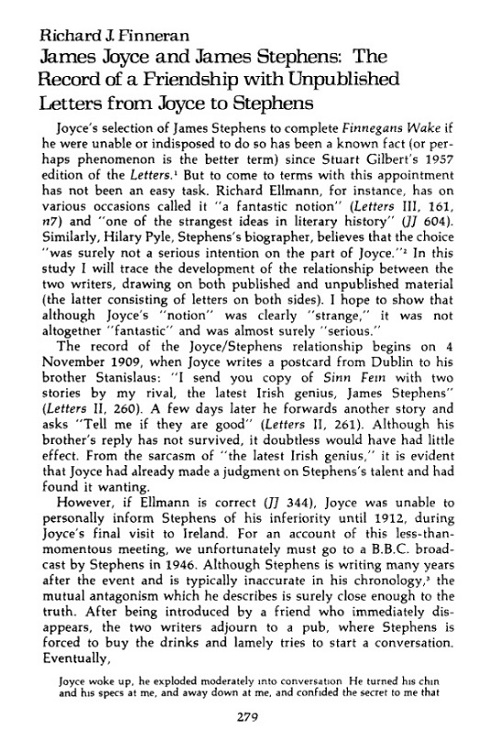 |
| —Available at JSTOR -online; accessed 02.09.2020. |
Patrick Rafroidi, ‘The Irish Short Story in English: The Birth of a New Tradition’, in The Irish Short Story, ed. Terence Brown & Rafroidi (Gerrards Cross: Colin Smythe 1979): ‘James Stephens’ novel The Crock of Gold (1912) and the not easily classified work In The Land of Youth (1924) show an abundant Gaelic influence. Neither one of them however is simply imitation, the personal themes of the author, like Time and the condemnation of Mercantilism, are always close to the surface or even dominant and the plot is always original. Straddling the frontier of the real and the imaginary, his short stories proper also betray his memory of his readings of ancestral legends. This is especially true ofDesire ... the piece at the start of Etched in Moonlight.’ (p.20).
Léon Ó Bróin, Protestant Nationalists in Revolutionary Ireland (1985) - Alice Stopford Green impressed by Insurrection: ‘The picture of the week day by day seems to be very good, and his conclusions, too, seem very fair. The sad part is that all the recommendations for a hopeful future that he suggests have not been carried out, just the reverse; and that the opportunity is gone for ever. And you can’t fairly put all the blame on the Irish for their lack of cohesion, as people like to do.’ What no doubt left a mark on her was Stephen’s avowal that there was no future for Ireland until the question of her freedom had by some means been settled, for that ideal had captured the imagination of the race. Stephens dismissed criticism of the leaders of the insurrection. Three of these whom he knew personally were more scholars than thinkers, and more thinkers than men of action, but they were good men and willed no evil. Their nominal President [MacNeill] was a good man too [...] accused of treachery [...] but not [a] traitor [...] German intrigue and money and counted for so little as to be negligible.’ (p.129.)
[top ]
Jochen Achilles, ‘The Charwoman’s Daughter and the Emergence of National Psychology’, inIrish University Review 11, 2 (Autumn 1981), pp.184-97
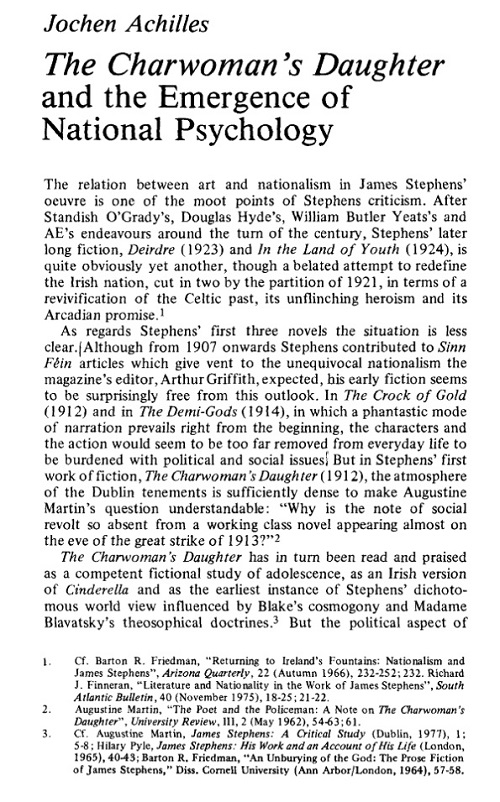 |
| —Available at JSTOR -online; accessed 24.09.2020. |
[top ]
J. W. Foster, Fictions of the Irish Literary Revival: A Changeling Art (Dublin: Gill & Macmillan 1987) - Chapter: ‘Mount of Transfiguration: The Writer as Fabulist - W. B. Yeats & James Stephens ’ [IV: 12], pp.236-72.| [...] |
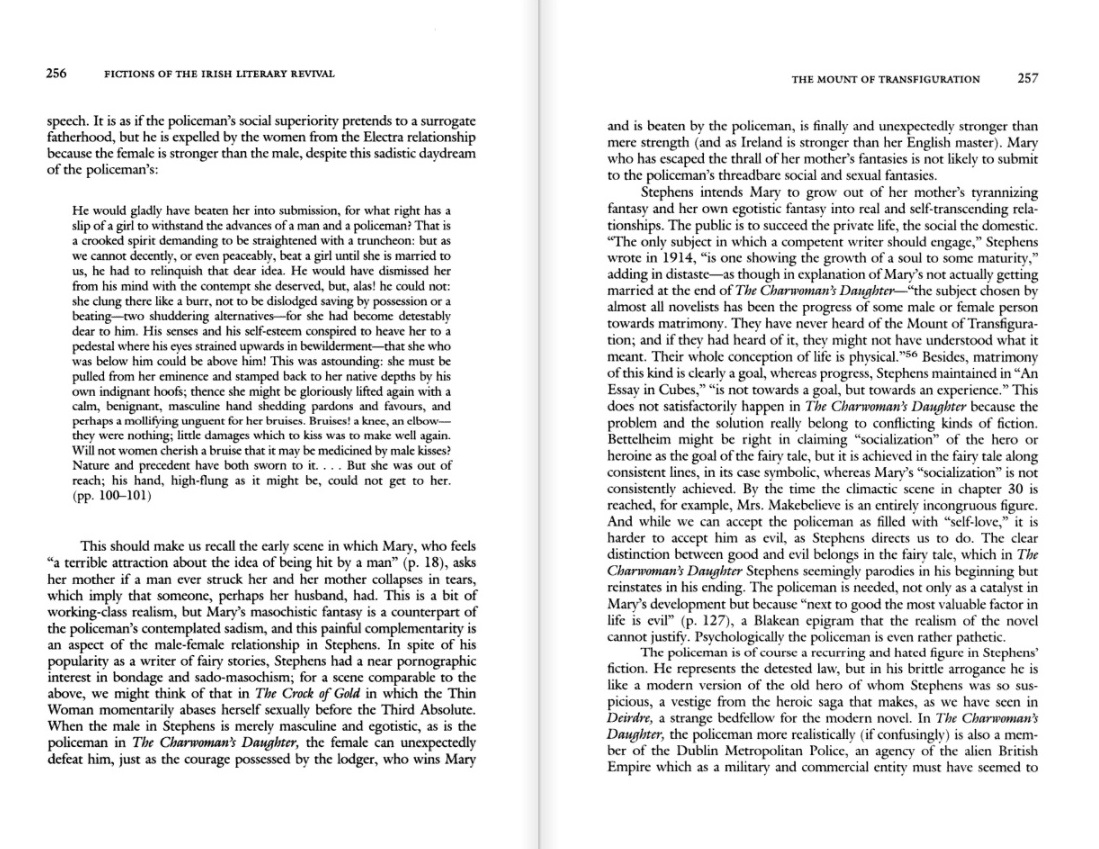 |
| See more page-images - as attached]. |
|
| See longer extracts - as attached. |
Brigit Bramsback, ‘James Stephens and Paris: Insight [...] from Letters to Thomas Bodkin’, in Ireland and France - A Bountiful Friendship: Essays in Honour of Patrick Rafroidi, ed. Barbara Hayley & Christopher Murray (Gerrards Cross: Colin Smythe 1992), pp.93-106: Stephens was learning French in Paris, with the help of Bodkin. [...] Stephens jumped with delight at the suggestion made to him by Bodkin in June 1915 to apply for the Registrarship of the National Gallery of Ireland [...] one of the Gallery governors fiercely resisted his candidature; he sent a letter of withdrawal via Bodkin which Bodkin however did not forward; appointed to the position in August 1915, first as Unestablished Registrar, then as Established Reg., and finally as Accounting Officer. Moved to London in 1925. Stephens broke with Bodkin after a flare-up at the Gallery in 1924, concerning the sell-on price of his MSS in America. After his death, Mrs Stephens supplied papers to Reginald Pound, son of Ezra, forLife and Letters of James Stephens, around Jan. 1954, but nothing came of it.
[top ]
Werner Huber, ‘Towards a “Comédie Humaine of Ireland”: The Politics of James Stephens’s Early Novels’, in Troubled Histories, Troubled Fictions: Twentieth-century Anglo-Irish Prose, ed. Theo d’ Haen, José Lanters [The Literature of Politics and the Politics of Literature, Vol. 4] (Amsterdam & Atlanta, GA: Rodopi 1995), pp.95-104.
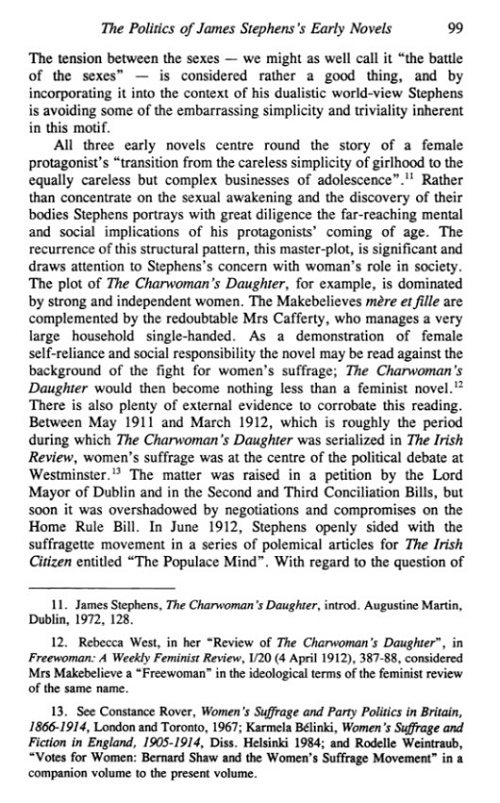 | 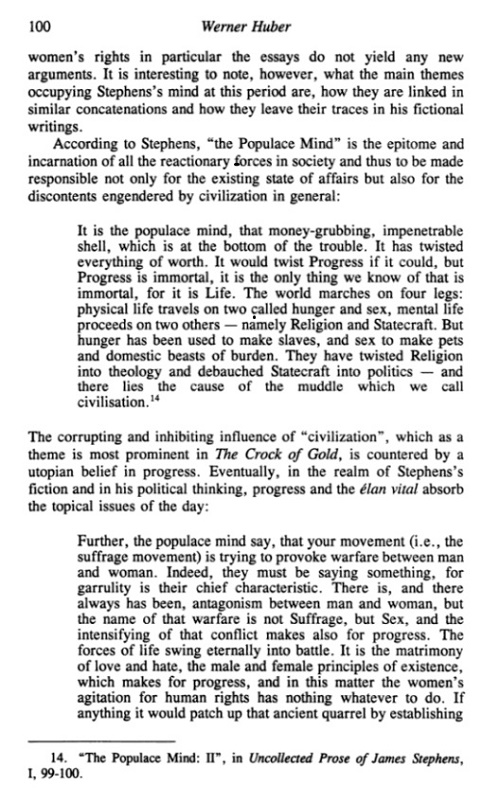 |
| Available in Google Books -online; accessed 24.09.2020. | |
| Partial transciption [includes foregoing remarks]: | |
|
|
|
|
|
|
|
|
|
|
[top ]
Joseph Lennon, ‘James Stephens’s Diminutive National Narratives: Imagining an Irish Nation Based on the “Orient”’, in The Comparatist [‘Postcolonial Theory and Irish Literature’ - Special Issue, guest ed., Michael R. Molino], Vol. XX [Virginia Commonwealth Univ.] (May 1996), pp.62-81 - page view: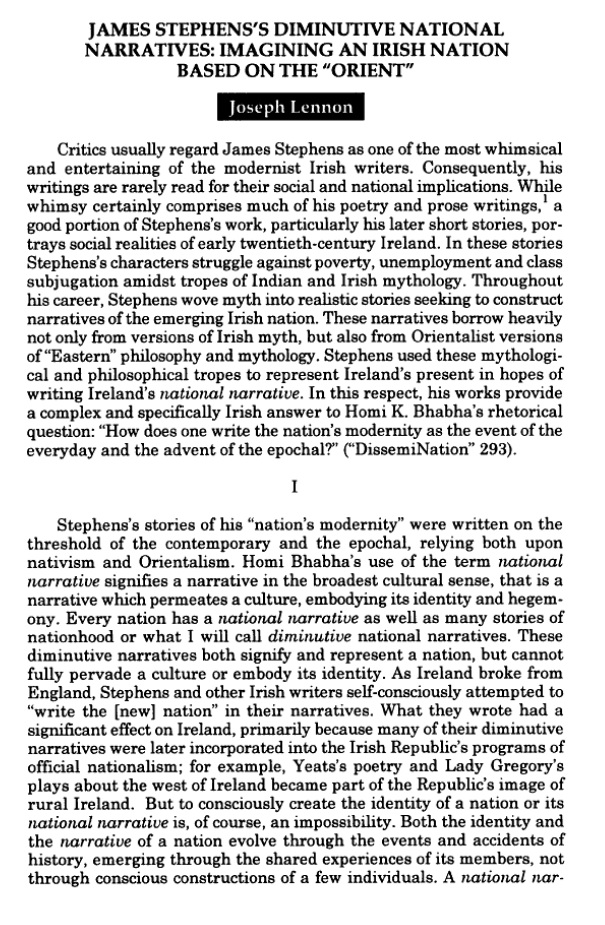 |
Transcription: ‘Critics usually regard James Stephens as one of the most whimsical and entertaining of the modernist Irish writers. Consequently, his writings are rarely read for their social and national implications. While whimsy certainly comprises much of his poetry and prose writings, a good portion of Stephens’s work, particularly his later short stories, portrays social realities of early twentieth-century Ireland. In these stories Stephens’s characters struggle against poverty, unemployment and class subjugation amidst tropes of Indian and Irish mythology. Throughout his career, Stephens wove myth into realistic stories seeking to construct narratives of the emerging Irish nation. These narratives borrow heavily not only from versions of Irish myth, but also from Orientalist versions of “Eastern” philosophy and mythology. Stephens used these mythological and philosophical tropes to represent Ireland’s national narrative. In this respect, his works provide a complex and specifically Irish answer to Homi K. Bhabha’s rhetorical question: “How does one write the nation’s modernity as the event of the everyday and the advent of the epochal” (“DissemiNation”, p.293.) |
| —Available at JSTOR - online; accessed 18.05.2021. |
[top ]
| Derek John, ‘James Stephens (1880-1950)’, in The Green Book: Writings on Irish Gothic[...] (Samhain 2018), pp.80-88. | Gerry Nolan, ‘Apocalypse in James Stephens: 1912-1914’, in Hungarian Journal of English and American Studies (HJEAS 8.2.2020), pp.5-17. | |
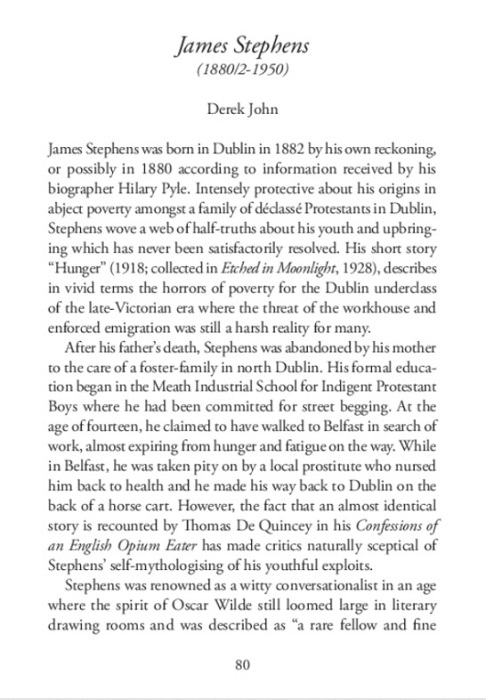 |
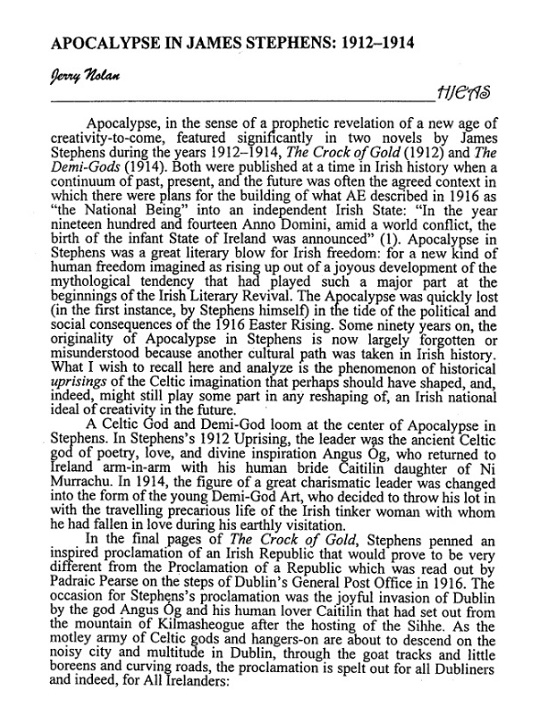 |
|
| —Available at JSTOR -online; accessed 24.09.2020. | —Available at JSTOR -online; accessed 13.10.2020. | |
| Gerry Nolan writes (as above): ‘In the final pages ofThe Crock of Gold, Stephens penned an inspired proclamation of an Irish Republic that would prove to be very different from the Proclamation of a Republic which was read out by Padraic Pearse on the steps of Dublin’s General Post Office in 1916. The occasion for Stephen’s proclamation was the joyful invasion of Dublin by the god Angus Og and his human lover Caitilin that had set out from the mountain of Kilmasheogue after the hosting of the Sihhe [sic for Sidhe]. As the motley army of Celtic gods and hangers-on are about to descend on the noisy city and multitude in Dublin, through the goat tracks and little boreens and curving roads, the proclamation is spelt out for all Dubliners and indeed, for All Irelanders. [quotes ending.]’ (‘Apocalypse in James Stephens: 1912-1914’, in HJEAS,8.2.2020, pp.5-17.p.5; note that the word <proclamation> is not actually used in the text of The Crock of Gold) | ||
[top ]
Frances Ferguson, ‘Eimar O’Duffy and the Waste of 1916’ [chap.], in Remembering Revolution: Dissent, Culture and Nationalism in the Irish Free State(Oxford UP 2015): ‘While in Paris, [Eimar] O’Duffy received the news that the manuscript ofKing Goshawk had been accepted by London publishers Macmillan. His work would join a publication list of distinguished books taking a heterodox line on nationalism, including four of James Stephens’ novels. [...] Writing under the pseudonym Y.O., George Russell also expressed amusement but dropped in a casual accusation of plagiarism, claiming that O’Duffy had taken the idea of writing about a philospher form Russell’s friend James Stephens’ The Crock of Gold. Although some parallels existed, (and were observed by the Manchester Guardian) the tone and analytic focus of the books was entirely different, and O’Duffy fiercely and convincingly denied Russell’s accusation.’ (p.72).Ftns: Russell, review ofGoshawk by Eimar O’Duffy, in Irish Statesman, 23 Aug. 1926, p.164. O’Duffy, letter to the Editor,Irish Statesman (6 Nov. 1926), p.204.
| Michael Dirda, ‘The perfect book for St. Patrick’s Day’, in The Washington Post (14 March 2018) |
|
| See full-text copy in RICORSO Library > Criticism > Reviews - as attached; also available - online; accessed 25.10.2020.. |
Gregory Dobbins, ‘The Materialist-Fabulist Dialectic: James Stephens, Eimar O’Duffy, and Magic Naturalism’, in The Oxford Handbook of Modern Irish Fiction, ed. Liam Harte (Oxford UP 2020), pp.133-50: ‘Although the term is unwieldy, by “populace mind” Stephens means something like the ideological forces, rooted in social convention, which determine what is “natural” and what is “unnatural” and speaks of the ‘power imbalances which are inherent to modernity, such that The Crock of Gold demands the institution of marriage be dismantled to breat equality between partners.’ (p.143.)
[top ]